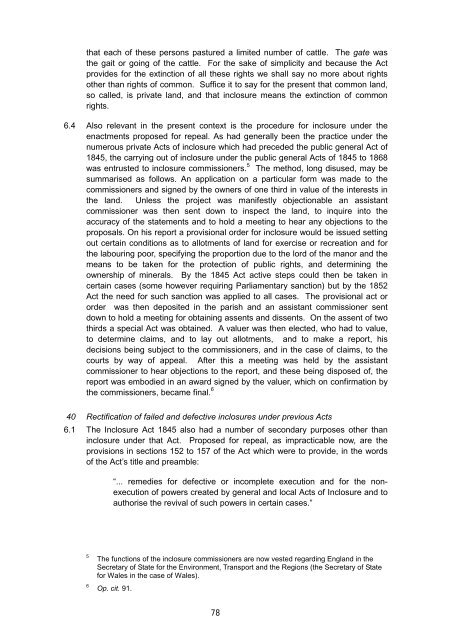STATUTE LAW REVISION: SIXTEENTH ... - Law Commission
STATUTE LAW REVISION: SIXTEENTH ... - Law Commission
STATUTE LAW REVISION: SIXTEENTH ... - Law Commission
Create successful ePaper yourself
Turn your PDF publications into a flip-book with our unique Google optimized e-Paper software.
that each of these persons pastured a limited number of cattle. The gate was<br />
the gait or going of the cattle. For the sake of simplicity and because the Act<br />
provides for the extinction of all these rights we shall say no more about rights<br />
other than rights of common. Suffice it to say for the present that common land,<br />
so called, is private land, and that inclosure means the extinction of common<br />
rights.<br />
6.4 Also relevant in the present context is the procedure for inclosure under the<br />
enactments proposed for repeal. As had generally been the practice under the<br />
numerous private Acts of inclosure which had preceded the public general Act of<br />
1845, the carrying out of inclosure under the public general Acts of 1845 to 1868<br />
was entrusted to inclosure commissioners. 5 The method, long disused, may be<br />
summarised as follows. An application on a particular form was made to the<br />
commissioners and signed by the owners of one third in value of the interests in<br />
the land. Unless the project was manifestly objectionable an assistant<br />
commissioner was then sent down to inspect the land, to inquire into the<br />
accuracy of the statements and to hold a meeting to hear any objections to the<br />
proposals. On his report a provisional order for inclosure would be issued setting<br />
out certain conditions as to allotments of land for exercise or recreation and for<br />
the labouring poor, specifying the proportion due to the lord of the manor and the<br />
means to be taken for the protection of public rights, and determining the<br />
ownership of minerals. By the 1845 Act active steps could then be taken in<br />
certain cases (some however requiring Parliamentary sanction) but by the 1852<br />
Act the need for such sanction was applied to all cases. The provisional act or<br />
order was then deposited in the parish and an assistant commissioner sent<br />
down to hold a meeting for obtaining assents and dissents. On the assent of two<br />
thirds a special Act was obtained. A valuer was then elected, who had to value,<br />
to determine claims, and to lay out allotments, and to make a report, his<br />
decisions being subject to the commissioners, and in the case of claims, to the<br />
courts by way of appeal. After this a meeting was held by the assistant<br />
commissioner to hear objections to the report, and these being disposed of, the<br />
report was embodied in an award signed by the valuer, which on confirmation by<br />
the commissioners, became final. 6<br />
40 Rectification of failed and defective inclosures under previous Acts<br />
6.1 The Inclosure Act 1845 also had a number of secondary purposes other than<br />
inclosure under that Act. Proposed for repeal, as impracticable now, are the<br />
provisions in sections 152 to 157 of the Act which were to provide, in the words<br />
of the Act’s title and preamble:<br />
“... remedies for defective or incomplete execution and for the nonexecution<br />
of powers created by general and local Acts of Inclosure and to<br />
authorise the revival of such powers in certain cases.”<br />
5 The functions of the inclosure commissioners are now vested regarding England in the<br />
Secretary of State for the Environment, Transport and the Regions (the Secretary of State<br />
for Wales in the case of Wales).<br />
6 Op. cit. 91.<br />
78

















